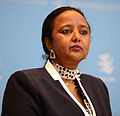 | |
| Presidency of Uhuru Kenyatta 9 April 2013 –13 September 2022 | |
Uhuru Kenyatta | |
| Party | Jubilee Party |
| Seat | State House,Nairobi |
The presidency of Uhuru Kenyatta began on 9 April 2013 after being sworn in as 4th president of Kenya and ended on 13 September 2022 after handing over to William Ruto. He succeeded Mwai Kibaki. During his inaugural speech Uhuru promised economic transformation by 2030 [ clarification needed ],unity among all Kenyans,free maternal care and that he would serve all Kenyans. [1] [2] [3] In 2017,he won a second term on 8 August and upon a Supreme Court verdict,the results were repealed. The resulting elections were controversial as Raila Odinga boycotted the elections and as the only other active candidate,he won by a 98% victory with the lowest turn out. A stalemate would result as Raila and His partners would carry out a parallel swearing in ceremony after Kenyatta's swearing in. Riots would break out as Raila entered the country resulting in a number of deaths. On 28 March the two partnered to form the Building bridges initiative ending the tense political atmosphere present in the country.










